- Home
- Dornford Yates
B-Berry and I Look Back
B-Berry and I Look Back Read online
Copyright & Information
B-Berry and I Look Back
First published in 1958
© Estate of Dornford Yates; House of Stratus 1958-2011
All rights reserved. No part of this publication may be reproduced, stored in a retrieval system, or transmitted, in any form, or by any means (electronic, mechanical, photocopying, recording, or otherwise), without the prior permission of the publisher. Any person who does any unauthorised act in relation to this publication may be liable to criminal prosecution and civil claims for damages.
The right of Dornford Yates to be identified as the author of this work has been asserted.
This edition published in 2011 by House of Stratus, an imprint of
Stratus Books Ltd., Lisandra House, Fore Street, Looe,
Cornwall, PL13 1AD, UK.
Typeset by House of Stratus.
A catalogue record for this book is available from the British Library and the Library of Congress.
EAN ISBN Edition
1842329642 9781842329641 Print
075512684X 9780755126842 Kindle
0755127056 9780755127054 Epub
This is a fictional work and all characters are drawn from the author’s imagination.
Any resemblance or similarities to persons either living or dead are entirely coincidental.
www.houseofstratus.com
About the Author
Born ‘Cecil William Mercer’ into a middle class Victorian family with many Victorian skeletons in the closet, including the conviction for embezzlement from a law firm and subsequent suicide of his great-uncle, Yates’ parents somehow scraped together enough money to send him to Harrow.
The son of a solicitor, he at first could not seek a call to the Bar as he gained only a third class degree at Oxford. However, after a spell in a Solicitor’s office he managed to qualify and then practised as a Barrister, including an involvement in the Dr. Crippen Case, but whilst still finding time to contribute stories to the Windsor Magazine.
After the First World War, Yates gave up legal work in favour of writing, which had become his great passion, and completed some thirty books. These ranged from light-hearted farce to adventure thrillers. For the former, he created the ‘Berry’ books which established Yates’ reputation as a writer of witty, upper-crust romances. For the latter, he created the character Richard Chandos, who recounts the adventures of Jonah Mansel, a classic gentleman sleuth. As a consequence of his education and experience, Yates’ books feature the genteel life, a nostalgic glimpse at Edwardian decadence and a number of swindling solicitors.
In his hey day, and as testament to his fine writing, Dornford Yates’ work often featured in the bestseller list. Indeed, ‘Berry’ is one of the great comic creations of twentieth century fiction; the ‘Chandos’ titles also being successfully adapted for television. Along with Sapper and John Buchan, Yates dominated the adventure book market of the inter war years.
Finding the English climate utterly unbearable, Yates chose to live in the French Pyrenées for eighteen years, before moving on to Rhodesia (as was), where he died in 1960.
‘Mr Yates can be recommended to anyone who thinks the British take themselves too seriously.’ - Punch
‘We appreciate fine writing when we come across it, and a wit that is ageless united to a courtesy that is extinct’ - Cyril Connolly
Dedication
To the memory
of that brilliant novelist
‘SAKI’
(H H Munro)
whose first cousin I had the honour to be. It was a true honour. Gently bred, aged forty-four, Hector enlisted on the outbreak of the first great war. A very fine linguist, more than once he was offered a Commission and an appointment to GHQ, but he preferred to fight and die a corporal, in the front line.
Note
Hardly had As Berry and I Were Saying gone to press, when I began to remember occasions and incidents – all true – which might well have been related in that book. For what they are worth, here they are. As before, I have given them a fictional setting; for the many letters I received, thanking me for As Berry and I Were Saying, suggest that a memoir is more palatable when presented as a ‘conversation piece’. As before, Berry contributes some monographs as well as a downright commentary upon the memories themselves: and the memoir is introduced by an account of a bereavement which he suffered less in sorrow than in indignation. Perhaps I may be forgiven for repeating that the memories themselves are strictly true and that I have exaggerated nothing.
DORNFORD YATES
1
“I won’t,” said Berry.
“My darling,” said Daphne, “you can’t go on like this.”
“Yes, I can,” said Berry. “I can continue indefinitely.”
“But supposing the pain comes back?”
“Don’t dress it up,” said her husband. “It wasn’t pain at all. It was concentrated agony.”
“Well, supposing that comes back?”
“The attack,” said Berry, “which was as prolonged as it was venomous, coincided with a spell of the most vile and abnormal weather ever known in this temperate zone. Provided that Nature is no longer subjected to the impudent horseplay of the Bigger and Better Block-Busting and Blast Brigade, I have every reason to believe that atmospheric conditions will not reflect an ill-temper which was fully justified. In such circumstances, my teeth will not ache.”
“But it’s very bad for you. You can’t bite up your food.”
“I gnash it,” said Berry. “I’ve got very good at gnashing. And so long as I’m not repugnant…”
“The X-Rays,” said Jonah, “disclose—”
“I know, I know,” said Berry. “According to them, I’m only fit to haunt a sewage-farm. But I’ve not yet been asked to leave any place of entertainment and, so far, no one has swooned when I have engaged them in talk.”
“But it’s bad for you, darling,” said Daphne. “Terribly bad. You’re being poisoned, day and night.”
“Well, I feel very well on it,” said Berry. “When I was Mithridates—”
“The agony,” said I, “has passed. But we’re talking of sailing the sea in two months’ time. Supposing the pain returns when we’re two days out.”
Berry regarded me with great malevolence.
Then–
“I suppose,” he said, “I suppose it’s your legal mind. Be that as it may, your capacity for perceiving and indicating a bestial possibility is hideously disconcerting.”
“I’m sorry,” I said. “But, for all our sakes, I want you to weigh it up.”
“D’you think I haven’t?” said Berry. “I tell you, the scales of my brain have very near broken down. Three-score years and ten, and not a false tooth in my head. And now I’m to cast this record into the draught. And all the care I’ve lavished upon my jaws! Some teeth have been drawn, I know – and that, with a reluctance which I most heartily shared. But they clamoured to be removed – at least, I suppose they did; for, when they’d gone, the immediate agony ceased. But if but one more is removed, I shall be forced to employ auxiliaries. Otherwise, I shall repel all who see me; and my enunciation will be defective – the singular will become plural, against my will; and gnashing will present difficulty. All of which points to the poisonous conclusion that, since those that are left are failing, it would be common sense to make a clean sweep.
“And that is what fazes me.
“Hitherto, I have always reserved the finger-bowl for—”
A shriek from Daphne and Jill cut short the sentence.
“There you are,” said Berry. “And a moment ago you were insisting that vivisection alone would save my life.”
“We trust,” said I, “that
you will not construe any, er, acquisition which you may make as conferring a licence to abandon the decencies.”
“Of course not,” said Berry. “Of course not. But I may have difficulty at first. I may underestimate the pull of a marron glacé or the thrust of lobster cardinal.” He frowned. “It would, you will agree, be imperative that in such a case the strain upon the mandible should be immediately relieved.”
“But not in public,” cried Daphne.
“Certainly not,” said Berry. “In the bosom.”
There was a pregnant silence.
Then–
“Is that a biblical allusion?” said Jonah.
“No,” said Berry. “Familiar.”
Jill began to shake with laughter.
“Of course,” said Daphne, “if you’re sure that you’re now in no pain…”
“None,” said Berry. “As I have said, it was the inspired malignancy of the weather that provoked my teeth. They’re not as young as they were, and they saw no reason why they should be butchered to make an atom holiday. First, then, I have no pain. Secondly, though I lack several of my incisors, provided I avoid the less attractive habits of the bulls of Bashan, I give my neighbours no offence. Thirdly, in spite of the radiologist’s report, my health leaves nothing to be desired. Fourthly, in case of accidents, Rodrigues has a mould of my mouth. In these circumstances, deliberately to purchase incredible inconvenience at a very high price seems to me irrational. I may be wrong.”
“My darling,” said Daphne, “all we want is to keep you well and happy and comfortable.”
“The Women’s Institute,” said Berry, “assures The Old Folk’s Home.”
“You know what I mean. Now, if to bring this off, you’ve got to have them all out, then you must do it. I mean, if that’s the price of your health. But if that’s not necessary yet, I’m the last person to—”
“Let sleeping dogs lie,” said Berry.
“I’m inclined to agree,” said Jonah. “But the very next time they stir…”
Three days later, at half past four in the morning, the sleeping dogs woke. And more than woke. They stretched themselves and sat up. I’m not sure they didn’t bark.
Grey in the face with pain, Berry stood the assault extremely well. But action had to be taken. At half past five that evening he entered a nursing-home.
Two days later we were seated about his bed.
“Mhat mife hmeebig mogs mow?” he demanded.
“Darling,” said Daphne, “for heaven’s sake don’t try to talk.”
Her husband seized his pad and wrote some words violently down.
Looking over his shoulder, Jill read the sentence aloud.
“I abhor my vacuum. How soon can it be filled?”
“Darling,” said Daphne, “your poor gums have got to heal.”
Berry made a noise like a cat. Then he snatched his pad and scrawled his riposte.
“Will you answer my question?” read Jill.
“Very soon, darling,” purred Daphne. “Rodrigues is coming on Thursday to take the stitches out.”
Berry looked dazedly round.
“Miggies? Mop miggies?” he demanded.
Daphne swallowed.
Then–
“Darling, he’s done your teeth in the very latest way. This will ensure that your new ones fit like a glove.”
Berry seized his pad.
“Gloves be damned. Exactly what has this butcher done to my mouth?”
“As I understand it,” I said, “Rodrigues laid open your gums upon either side. This exposed the roots of your teeth. The latter were then picked out, instead of lugged. It was then very simple to swill the groove right out. When this had been done, the flaps were put back into place and stitched together. When they’re healed, you’ll have clean, smooth bars running right round your mouth.”
Berry’s face was a study.
After a moment or two, he picked up his pad.
“A major operation, without my consent. Supposing my heart had given out.”
“Why should it?” said Jonah. “This is a vast improvement on lugging out tooth after tooth. Far less shock to the system.”
“I should have been consulted,” wrote Berry.
“My darling,” said Daphne, “you weren’t in a state to consult. I had to decide for you.”
“I was mad with pain,” wrote Berry. “America must have just found the carbolic bomb. Can I go home now?”
“As soon, my sweet, as you have the stitches out. Have you any pain now?”
“Well, I suppose you might call it pain. My mouth feels as if it had been recently flayed, after having been jacked up first.”
“I’m sure,” said I, “that Rodrigues knows his job.”
“I’m glad of that,” wrote Berry. “I mean after all this, it would be nice to find he didn’t, wouldn’t it? I suppose they counted the swabs. Of course it feels as if he’d left a couple of forceps behind.”
“Oh, he’d’ve seen them,” said Jonah. “It’s only in abdominal operations that they leave their tools behind. Of course if he let a pair slip…”
“Emoove pvat mam,” raged Berry. “Amome be mawpet. Mll mem my membiber ub.”
We calmed him down and produced the backgammon board.
2
A fortnight later Jonah’s Rolls stole up to the foot of the steps.
Carson alighted and opened the near-side door. And Berry got out.
“Thank you, Carson,” he said. “Do they look all right?”
“They look a treat, sir,” said Carson.
“Good,” said Berry – and turned to us on the steps.
At the foot, he paused: then he uncovered and gave us a film-star smile.
“Marvellous,” said Daphne.
And so they were.
“Are they comfortable?” said I.
“I keep on forgetting,” said Berry, “I’ve got them in.”
“Isn’t that fun?” said Jill.
“Try and yawn,” said Jonah.
The suggestion was enough.
My brother-in-law yawned. But his teeth never moved.
“That’s a great triumph,” said I.
Berry mounted the steps and embraced his wife.
“How does it feel to be kissed by a man with false fangs?”
“Very nice,” said Daphne. “Do it again. And now come in and sit down. Tea’s just about due.”
“I see,” said Berry, thoughtfully. “Tea. Yes. I could do with a cuppa.”
“Bridget,” said Jill, “has made a ‘washerwoman’s cake’.”
“Oh, dear,” said Berry. “I know. I’ll have it upstairs.”
“Don’t be absurd,” said Daphne. “They’ll never move.”
“I’m sure they won’t. They might belong to my jaws. But I don’t want to defile them – they look so nice and clean.”
“They’ll recover,” said Jonah. “A little paraffin in the water, and no one will know they’ve been used. Carson’ll do them for you: he’s got to wash the Rolls.”
As soon as he could speak–
“No,” said Berry. “Supposing they dented the bucket… You blasphemous dog,” he added, “wait till you see the gew-gaws. Their proper place is in the Rue de la Paix. And there’s Bridget. Bridget, come and look at my teeth.”
The housekeeper complied.
Then she turned to Daphne.
“Aren’t they lovely, madam? And they make you look younger, sir. No one would take you for more than fifty now.”
“Bridget’s quite right,” said Jill.
“Poor Faust,” said Berry. “If only he’d known Rodrigues…”
Tea was proceeding quietly, when Berry let out a yell and clapped a hand to his mouth.
“My God,” said Daphne, “don’t say—”
“They’re getting jealous,” howled Berry. “They’ve bitten my tongue.”
Before this contretemps, I confess that we all broke down.
“My darling,” wailed Daphne, “it’s
only because you’ve been without them so long.”
“Venomous swine,” raved Berry. “That’s what they are. Turning on the old hands like that. Have to have a false tongue presently.”
To do the occasion honour, we drank champagne that night. Perhaps because of this, dinner went with a bang.
We retired just before midnight.
At a quarter past twelve my sister came to our room.
“Oh, Boy, it’s dreadful,” she whispered. “He can’t get them out.”
Scantily clothed, Jill and I repaired to the neighbouring chamber. Jonah saw us, as he came to the head of the stairs.
Kneeling beside his bed, leaning over a face-towel, Berry was manhandling his jaws.
“But why the posture?” said Jonah.
“In case I drop them,” snarled Berry. “Then they’ll fall on the bed and come to no harm.”
“I should leave them,” said I. “Swill out your mouth like hell, and leave them alone. I mean it’s all to the good.”
“Nonsense,” said Berry. “Nonsense. Their bed of antiseptic is waiting. Besides, they haven’t been out yet. Or am I thinking of dogs?”
Her face pressed into my shoulder, Jill fought not to laugh.
“I’ll get a torch,” said Jonah. “I expect there’s a spring you press.”
“What d’you mean – a torch?” said Berry.
“Well, I don’t want to fumble,” said Jonah.
Berry looked round.
“He doesn’t want to fumble,” he said brokenly. He laughed a hideous laugh. “I don’t think he’d fumble long.”
“Darling,” said Daphne, “for God’s sake leave them in. And ring up Rodrigues tomorrow and he’ll tell you what to do.”
“But my mouth must be cleansed,” cried Berry. “Think of all the mess I’ve eaten tonight. And cheese straws and all.”
Jonah laid a hand on his shoulder.
“If I wash my hands in Dettol, will you let me get them out?”
“Not on your life,” said Berry. “You’ll break the blasted things.”

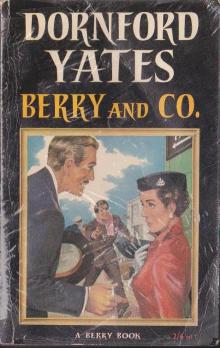 Berry and Co.
Berry and Co. Jonah and Co.
Jonah and Co.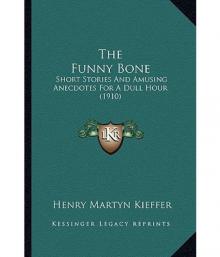 The Funny Bone: Short Stories and Amusing Anecdotes for a Dull Hour
The Funny Bone: Short Stories and Amusing Anecdotes for a Dull Hour The Brother of Daphne
The Brother of Daphne Courts of Idleness
Courts of Idleness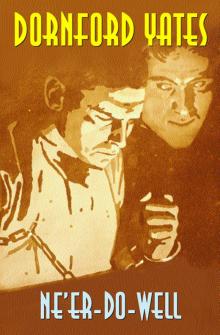 Ne'er Do Well
Ne'er Do Well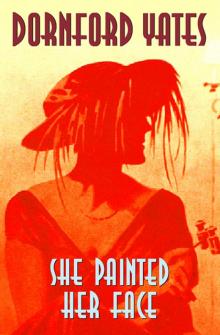 She Painted Her Face
She Painted Her Face Safe Custody and Laughing Bacchante
Safe Custody and Laughing Bacchante As Berry and I Were Saying
As Berry and I Were Saying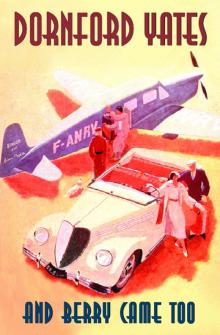 And Berry Came Too
And Berry Came Too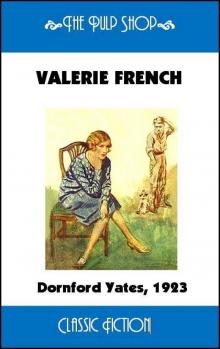 Valerie French (1923)
Valerie French (1923) Brother of Daphne
Brother of Daphne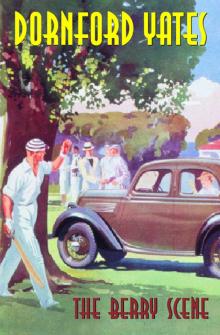 Berry Scene
Berry Scene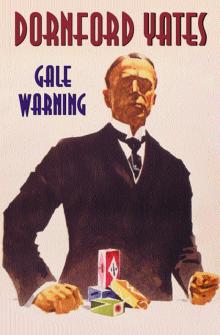 Gale Warning
Gale Warning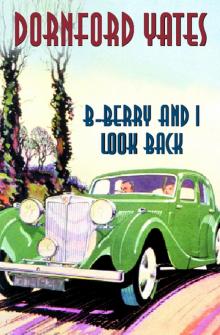 B-Berry and I Look Back
B-Berry and I Look Back Storm Music (1934)
Storm Music (1934) House That Berry Built
House That Berry Built